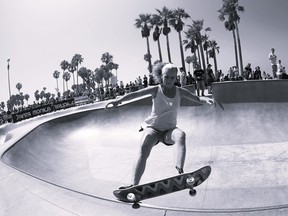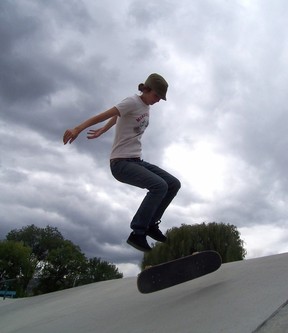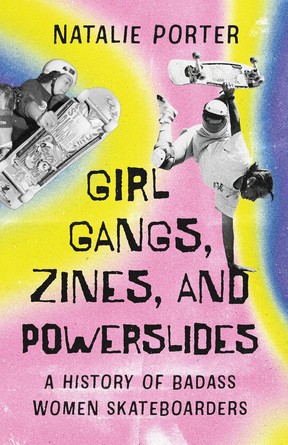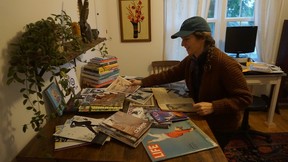B.C. author celebrates female skateboarders in new book
Girl Gangs, Zines and Powerslides: A History of Badass Women Skateboarders looks at an active subculture in the outlaw sport

Article content
Reviews and recommendations are unbiased and products are independently selected. Postmedia may earn an affiliate commission from purchases made through links on this page.
In Girl Gangs, Zines and Powerslides: A History of Badass Women Skateboarders, Powell River author Natalie Porter dives into the individuals and groups who disrupted the image of skateboarding as a male domain.
The text honours trail-blazing riders who have always been a part of the scene but often were denied their dues.
Founder of the Womxn Skateboard History archive, Porter is a professional librarian employed by the B.C. Library Association. She is also a subject expert for the Smithsonian’s skateboarding advisory board.
She has been skateboarding since 1995, and still hits the deck to keep in shape and have fun.
“I stated skateboarding at age 17 as it was the off-season thing to do when you weren’t snowboarding,” said Porter. “When I moved out to B.C. to go to SFU, I kind of joined a gang of girls who used to regularly meet and ride at Confederation Skate Park in Burnaby.
“Maybe twice a week I still try to get out to the local skate park to maintain some basic skills and have fun.”

The 368-page publication from ECW Press, which is dedicated to “the skater nerds,” arrives at a time when skateboarding is an Olympic sport and popular all over the planet. Many of the sport’s strongest athletes today are women.
Developed from a chapter of her master’s thesis on female skateboarding, the book took several decades to write.
Porter collected interviews, D.I.Y. zines and photos to amass an archive of content around the topic of female skateboarding history. This also expanded to include the world of nonbinary boarders and actions across the years showcasing icons such as the late Liz Bevington, who fought attempted bans on roller sports at Los Angeles’ Venice Beach, to the next generation of rising stars.

“A lot the back end work came from the 300 bios of female skaters in my online archive, which created the foundation of the book,” she said. “I’m the lone female skateboard historian on the Smithsonian advisory group, which is hoping to put together some kind of touring exhibit that we would like to see in L.A. in time for the coming Olympics.”
Skateboarding was far more equal when the sport began, as early competitions in the 1960s featured men’s and women’s divisions, with equal prizes for both. With each ebb and flow in popularity, the female presence started to get pushed out of the picture.
“As it became a big money maker in the 1970s and ’80s, women were still welcomed on company teams, but you see the divide on the pay equity and prize money,” Porter said. “Throughout that whole time that it was being rebranded as this hardcore, masculine pursuit, there were these groups of women putting out their own publications and fighting to get prize money reinstated on equal terms. I wanted that historical context to be celebrated to provide a through line right to the dynamic young women in the spotlight at the Tokyo and Paris Olympics and competitions.”

The book is eye-opening for its deep dives into the converging subcultures around skate and snowboarding, punk music, and actual girl gangs, like the skateboarding Los Angeles crew called the Hags. As well there were the Skate Bettys in Alaska, with their “skate muff or go home,” they were riot-girl feminists before the movement had emerged.
They were inspirations for many other female skateboarding crews to form and demand a part of the pavement and park.
The cross-cultural connections of the sport from Brazil to Japan and elsewhere is a source of constant fascination for the author, as she seeks to expand the scope of her archive and the continuing historical documentation. Porter says interesting pockets of young girl riders are appearing in the Philippines, Indonesia, Morocco, Ethiopia and other countries.
“It’s really happening everywhere and I’ve taken it upon myself to try to keep on top of it,” she said. “Everywhere you go, there are these iconic and talented women who are very empowering.”














Postmedia is committed to maintaining a lively but civil forum for discussion. Please keep comments relevant and respectful. Comments may take up to an hour to appear on the site. You will receive an email if there is a reply to your comment, an update to a thread you follow or if a user you follow comments. Visit our Community Guidelines for more information.